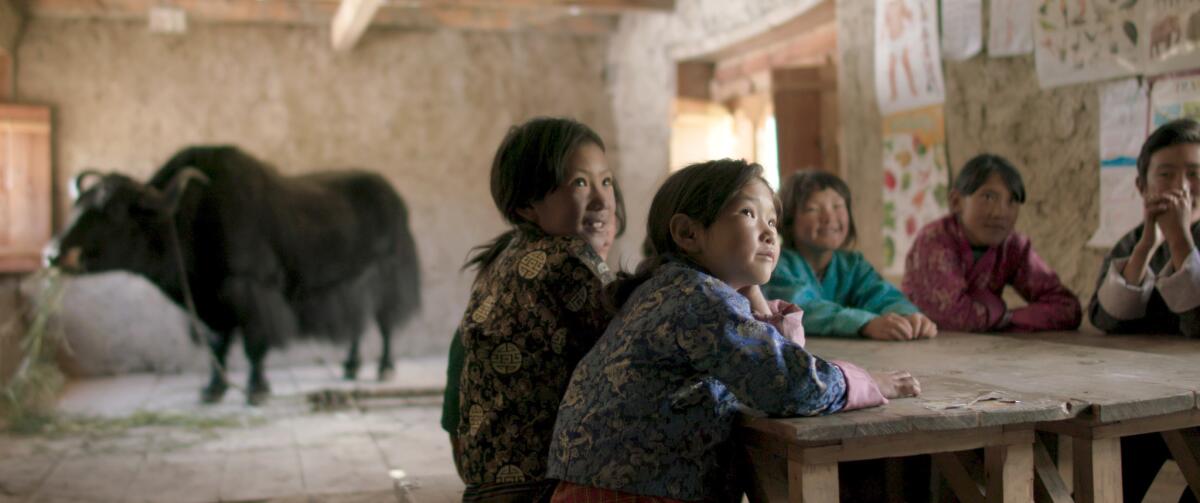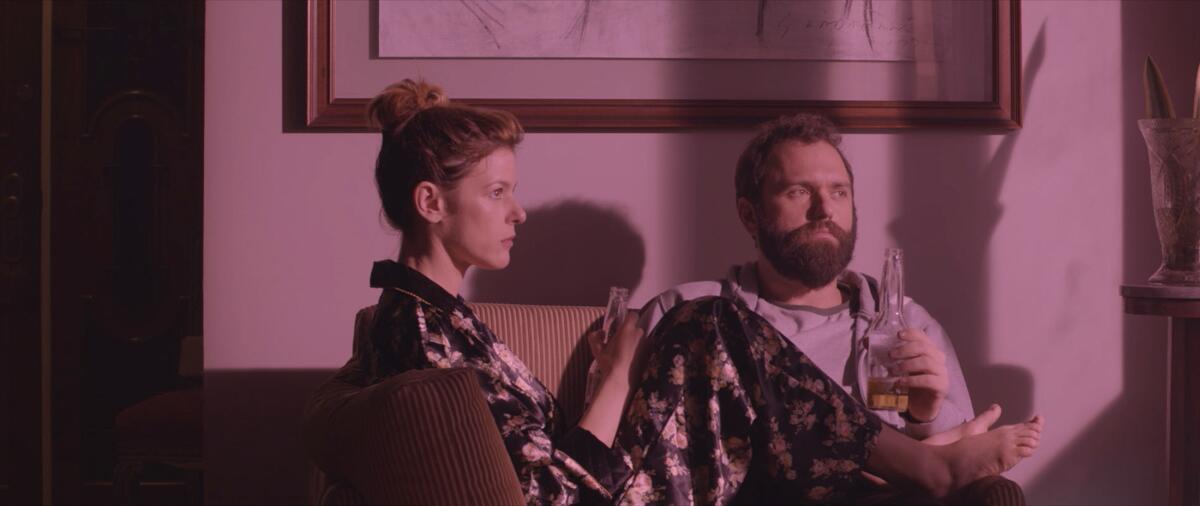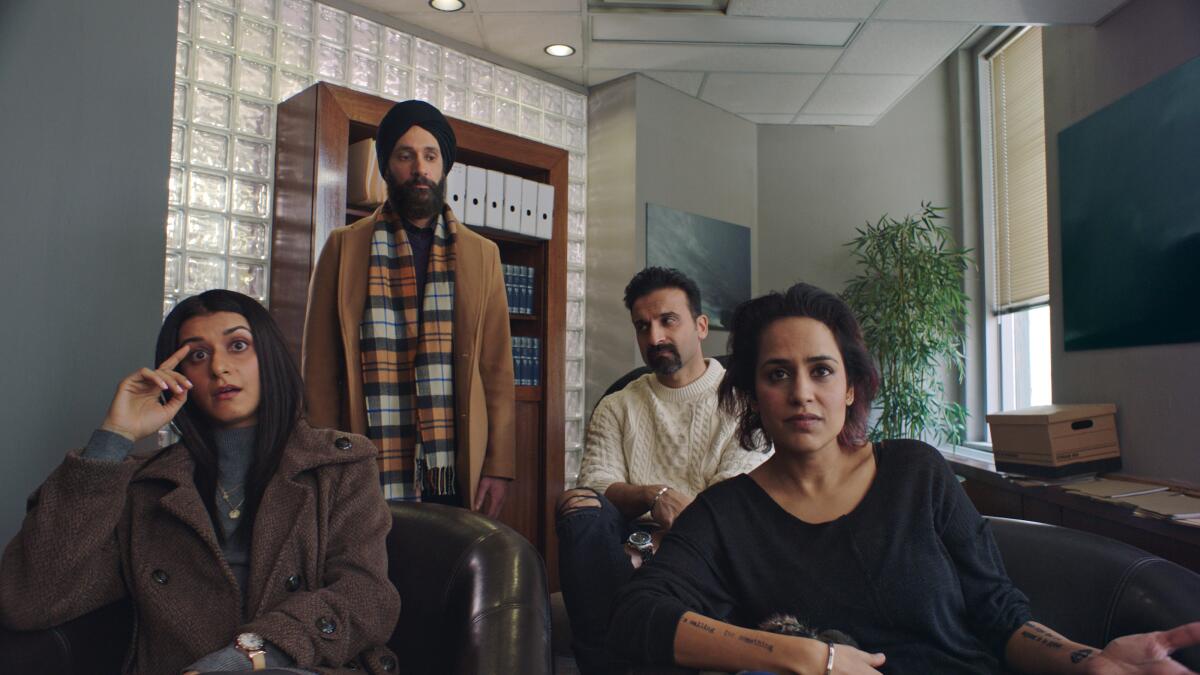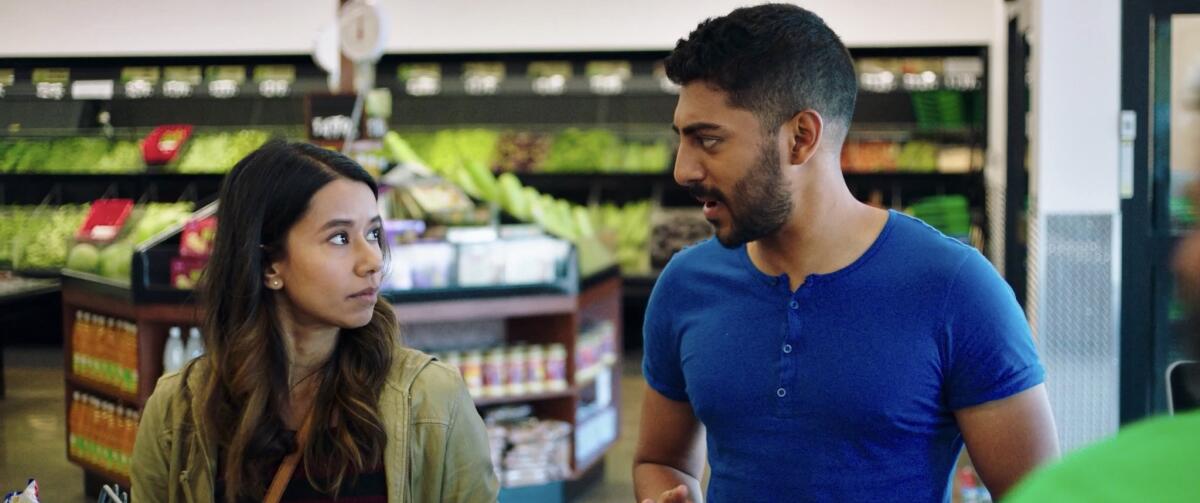Virtual Sundance brings the festival home
- Share via
Hello! I’m Mark Olsen. Welcome to another edition of your regular field guide to a world of Only Good Movies.
Only good movies
Get the Indie Focus newsletter, Mark Olsen's weekly guide to the world of cinema.
You may occasionally receive promotional content from the Los Angeles Times.
The 2022 Sundance Film Festival is underway. The shift to a mostly virtual event for a second year means that most anyone has the chance to engage with the movies without the snow and crowds of the festival’s typical home in Park City, Utah. Thursday’s opening-night lineup was especially strong, including docs such as “Fire of Love,” “La Guerra Civil” and “The Princess,” along with fiction features “When You Finish Saving the World,” “Fresh” and “A Love Song.”
Ahead of the festival, I spoke to Dakota Johnson about “Am I OK?” and “Cha Cha Real Smooth,” the two films she has in the festival as both actress and producer. They are the first completed projects from her TeaTime Pictures with partner Ro Donnelly. Johnson talked about the move to producing: “I think I just want to make a difference. I want to make it better. I want to have a better experience. I want to give more opportunities to amazing people to make things. I want to make more. I have such big dreams, it’s out of control. And I have so many ideas, and I just need to get them out. Even if they’re horrible and Ro’s like, ‘No, not that one.’”
Sonaiya Kelley spoke to John Boyega about his role in “892,” director and co-writer Abi Damaris Corbin’s film based on the real-life tale of Brian Brown-Easley, a Marine veteran who in 2017 held hostages at a bank after he couldn’t get his $892 VA disability check. The cast also includes Nicole Beharie, Selenis Leyva, Connie Britton and Michael K. Williams in one of his last roles.
“There’s definitely an emotional weight playing somebody that has existed who has had to live a tragedy in order for you to play him,” Boyega said. Brown-Easley’s ex-wife, Jessica, “told me it felt like I captured Brian. She was real descriptive of the experience of taking it in. She said that this movie is a direct lineage to Brian’s legacy: Brian wanted the world to know what was going on, how much frustration this was for people who’ve sacrificed so much for their country. The story is really [about] the isolation and betrayal that comes with serving your country and then coming back home to no opportunity or true help.”
The Los Angeles Times will again be hosting a series of talks with some of the top talent from the festival. Tracy Brown moderated a conversation on “Am I OK?” with directors Tig Notaro and Stephanie Allynne, screenwriter Lauren Pomerantz, actor-producer Dakota Johnson and actor Sonoya Mizuno. I hosted a talk about “Nanny,” with writer-director Nikyatu Jusu, producer Nikkia Moulterie and actors Anna Diop and Michelle Monaghan.
Meredith Blake will moderate a conversation on “God’s Country” with director and co-writer Julian Higgins, co-writer Shaye Ogbonna, producer Miranda Bailey and actor Thandiwe Newton. Jen Yamato hosts a talk about “Alice” with writer-director Krystin Ver Linden, producer Peter Lawson and actor and executive producer Keke Palmer. Amy Kaufman will lead a panel on “Sharp Stick” with writer-director Lena Dunham and cast members Kristine Froseth, Jon Bernthal, Jennifer Jason Leigh and Taylour Paige.
For The Envelope podcast this week, I spoke to Maggie Gyllenhaal about her debut feature as writer-director, “The Lost Daughter,” an adaptation of Elena Ferrante’s novel starring Olivia Colman, Jessie Buckley and Dakota Johnson. On her move into directing after years as a performer, Gyllenhaal said, “When I was younger, I spoke up all the time. And I got to see pretty quickly that most people aren’t that interested in actresses with ideas. So I learned to hold my cards close to my vest. But so much of my energy was spent trying to carve out the space to get what I needed artistically in order to express what I felt was important artistically.
“It’s not that I didn’t feel I could speak up and I was just sort of standing where someone said to stand. It’s like this thing that I read that Meryl Streep said, early on in my career. She said if you need something artistically as an actress, ask for it with a spoonful of sugar. So fine, great. That’s great advice. I took the advice for such a long time, but it’s a lot of work.”
Enjoying this newsletter? Consider subscribing to the Los Angeles Times
Your support helps us deliver the news that matters most. Become a subscriber.
‘Lunana: A Yak in the Classroom’
Written and directed by Pawo Choyning Dorji, “Lunana: A Yak in the Classroom” is Bhutan’s entry for the international feature Oscar and recently made the shortlist of 15 titles. In the charming, inspirational film, young teacher Ugyen (Sherab Dorji) is sent to a tiny, remote village to instruct the local children. The movie is playing in limited release.
For The Times, Carlos Aguilar wrote, “Opening the doors to a land and people most Westerners know little about, the director crafts a crowd-pleaser in stunning, mostly unseen locations whose charms weather even its most idealistically patriotic and overly saccharine notes. However far Ugyen goes, no tune will ever be more enchanting than the one that rests in ‘the world’s happiest country.’”
For the New York Times, Nicolas Rapold wrote, “The gently efficient story feels like an attempt to illustrate Bhutan’s real-life ‘Gross National Happiness’ initiative. … About that yak: He’s a gift to Ugyen (to produce dung fuel), and he sits and chews in the background of classroom scenes, just happy to be there. The film basks in a similar mood of mild-mannered contentment.”
For Variety, Richard Kuipers wrote, “There’s a lovely, natural flow to Ugyen shedding his indifference, collecting his yak dung and gradually embracing a simpler way of life in a place where, despite what he might have previously thought about country folk, learning is highly valued and teachers are greatly respected. … Donji’s screenplay finds an ideal balance of gentle humor and life-affirming drama.”

‘The Pink Cloud’
In “The Pink Cloud,” written and directed by Brazilian filmmaker Iuli Gerbase, Giovana (Renata de Lélis) and Yago (Eduardo Mendonça) wake up the morning after a one-night stand to find a dangerous pink cloud looming over the city and a government-ordered nationwide lockdown. They are forced to navigate not only the situation but each other. (The film opens with a disclaimer that it was written in 2017 and filmed in 2019.) The film is playing in limited release.
For The Times, Robert Abele wrote, “Gerbase, who also wrote ‘The Pink Cloud,’ obviously thought she was conjuring a Buñuel-like surreality through which to explore a confinement drama, not a contemporary mirror of a global pandemic. But that unforeseen (and spooky) bridging of intention and reality doesn’t make her assured, well-acted feature debut any less resonant or haunting as an allegorical portrait of our modern anxieties and delusions, especially as they pertain to societal expectations women still find themselves facing. … If you’re game for an emerging filmmaking talent’s stingingly uncanny foretelling, ‘The Pink Cloud’ is an arresting examination of what it can look like when existence is misshaped into a compromised destiny.”
For the New York Times, Claire Shaffer wrote, “Like other works of prescient sci-fi, ‘The Pink Cloud’ forecasts an eerie funhouse-mirror image of our present lives. … Even as the lockdown accelerates intimacy and conflict between the protagonists, their actions feel inconsequential compared with the greater world outside. ‘The Pink Cloud’ is at its most perceptive when it acknowledges this level of powerlessness, like when a hopeful conclusion to the disaster turns out to be a false alarm. Outside, the cloud floats along, with no dissipating end in sight.”
For RogerEbert.com, Ciara Wardlow wrote, “Though made prior to the pandemic, it is incredibly difficult to not view ‘The Pink Cloud’ through the lens of the past few years. The coincidences can be striking, like when a friend of Giovana’s, stuck facing the years of quarantine all alone because her boyfriend happened to be running errands when the cloud arrived, laments, ‘How come no one has a solution? A mask, something that allows us to go out, you know. To see people.’ There are moments like these where the uncanniness is rather fascinating. Unfortunately, on the whole, particularly later on, these similarities instead become disengaging — an abstraction of a reality we are all overtired of engaging with in any context, even if it’s coincidental.”

‘Donkeyhead’ and ‘Definition Please’
The distribution company Array released two movies onto Netflix this week from a pair of writer-director-stars with Agam Darshi’s “Donkeyhead” and Sujata Day’s “Definition Please.” Both explore adult coming-of-age for children of immigrant parents.
“Donkeyhead” is about Mona (Darshi), a struggling writer and the daughter of Indian parents living in Canada, who has been caring for her ailing father. When her three more-successful siblings come home to make final arrangements, long-simmering resentments and unresolved grievances come bursting forth.
For The Times, Carlos Aguilar wrote, “Darshi’s fantastic turn as Mona is reminiscent of Anne Hathaway’s role in ‘Rachel Getting Married’: a train wreck of a person hiding sorrow with charm and grasping at everything she can to halt her downward spiral before an irrevocable crash. … Caught between confrontation and compassion, the familiar but still heartrending ‘Donkeyhead’ acknowledges that the hurt others inflict on us, though never excused, may indeed derive from their own unexpressed and unresolved trauma.”

“Definition Please” tells the story of Monica Chowdry (Day), a childhood spelling bee champion who may have peaked with that accomplishment. Caring for her ill mother, she struggles to move forward in her life.
For The Times, Kimber Myers wrote, “‘Definition Please’ doesn’t always have the connective tissue needed to tell its story clearly, and it wobbles between comedy and melodrama, as unsure of its place in the world as Monica. However, Day has something as both an actress and a filmmaker. As a performer, there are moments where there is a palpable joy in her presence; it’s clear that Day delights in what she does. Similarly, her script sparks to life at times, and as a director, she demonstrates a unique style, interjecting spelled-out words and their meanings alongside nods to Bollywood cinema. ‘Definition Please’ is one of those debuts that doesn’t fully cohere on its own but hints at the promise of what the filmmaker can do.”

Only good movies
Get the Indie Focus newsletter, Mark Olsen's weekly guide to the world of cinema.
You may occasionally receive promotional content from the Los Angeles Times.




